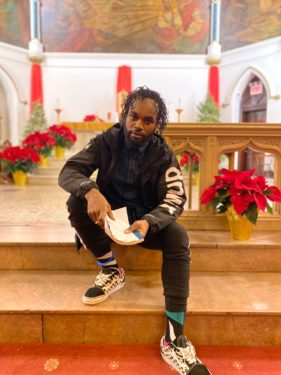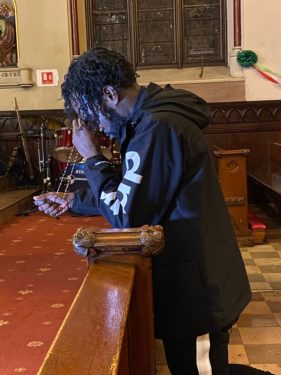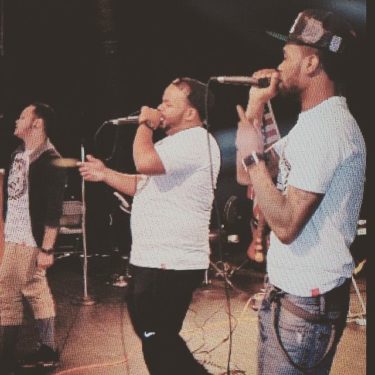RED HOOK — What rhymes with forgiveness?
That’s something Catholic rapper Melvin Windley, a.k.a. “Rabelzthemc,” may wonder. For him, hip-hop is an opportunity to proclaim the message of Divine Mercy to all.
Windley, a member of Visitation of the Blessed Virgin Mary Parish in Red Hook, grew up Baptist and was a secular artist prior to his conversion to the Catholic faith in 2005.
He started rapping and writing lyrics at a young age, inspired by artists like Tupac Shakur, who also grew up in the city. Windley credits his love of hip-hop to his Brooklyn upbringing.

“When Tupac died [in 1996], I realized how connected I was to hip-hop… but it’s such a thin veil in between Catholicism and hip-hop. It’s so easy to hit the switch, because it’s so different from secular music,” Windley said. “You at first don’t see anything. But then suddenly you meet God, and it’s like, there He is, clear as day.”
Windley said he had an epiphany watching the funeral of Gospel singer Luther Vandross, where people honored Vandross’ positive impact on the world through his Christian music and message.
“In that moment, once I had my conversion, I knew I needed to convert my music as well,” Windley said. “I had to fail a lot. I had to fail at my own attempts. At first, I thought I’d be a Christian rapper. I had no idea that Catholic hip-hop actually exists. When I found out there’s a whole community, a network of Catholic hip-hop, it was like, oh, this is what I’m supposed to do.”

His conversion began through encouragement from a woman he met at work. They would go to Mass together at St. Patrick’s Cathedral in Manhattan.
“My very first day at the church, a guy came up and asked if I wanted to bring up the collection baskets [for the offertory]. It was at that moment, I knew God wanted me to be a part of the church.”
Several years ago, Windley received a special gift: the Diary of St. Maria Faustina Kowalska, the early 20th-century saint and mystic who witnessed apparitions of Jesus. When he started reading the book, he felt “scared” and “ashamed” because he had not received Christ’s message of Divine Mercy as described to St. Faustina sooner.
That inspired Windley to switch his sound from secular to Catholic rap. It first required him to discover what makes his music truly unique.
“For most secular artists, there’s a gimmick, a certain trademark sound something that will let people relate to you. I didn’t have one. I just didn’t know what to do,” he said. “But for me, this is not a gimmick. This is for real. So I just kept praying and praying, and one day it dawned on me — I should do the Diary of Faustina, and the message of Divine Mercy. So here I am.”
Between his day job at a New Jersey medical building, Windley writes, produces, mixes, records and releases everything himself from his Red Hook home. Everything is self-funded or fueled through donations, including his laptop where he edits.
“A lot of young artists have trouble putting music out there because they think it has to be professional sounding, but really, it’s just about doing it.”
His first single, “Novena,” Windley describes as a “groundbreaking moment” and the first song he wrote where he identified as a Catholic hip-hop artist.
Two years later, Windley has several mixtapes, singles and two full-length albums.
He wants to impart the message of Jesus’ mercy and forgiveness, support church leaders struggling to connect youth with the message of Divine Mercy and encourage young listeners to pray the rosary.

His music draws from favorite prayers, saints, spiritual literature and his own life experiences. To help him stay focused and inspired, he pulls up St. Faustina’s diary on his phone.
“When I open the Diary, I allow the spirit to just bring me where it wants to. And then I’ll sift through what I stumble upon, and make music and lyrics from that. The most important aspect [is] the bold letters that Jesus spoke himself — I love those. When Jesus is talking, it’s time to pay attention.”
